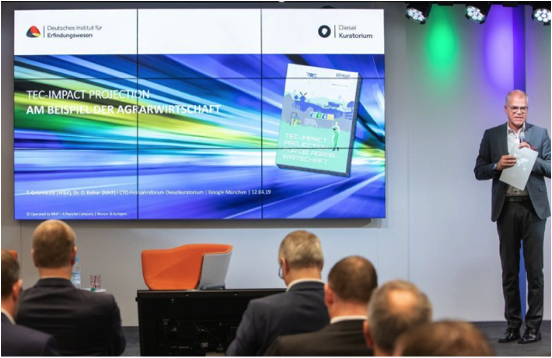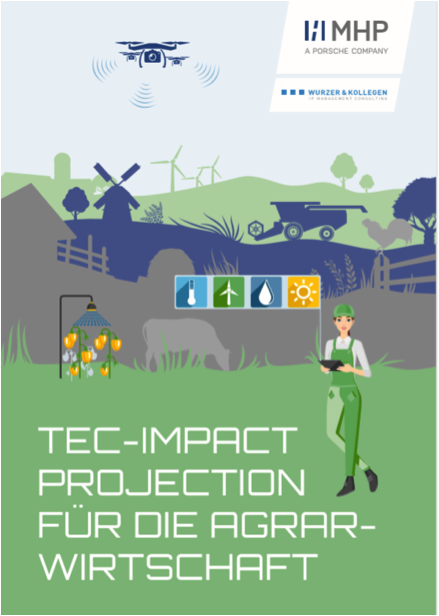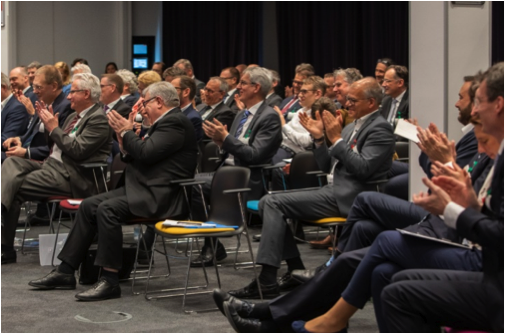MHP presents Tec-Impact Projection: Transformation of business eco-systems at the CTO spring forum at Google
On April 12th, at the CTO spring forum in the Google Engineering Center in Munich, a new type of analysis for transformation scenarios that become possible under the pressure of new technologies and other influencing factors for business eco-systems was presented: the Tec-Impact-Projection. As a management and IT consultancy for Porsche, MHP – A Porsche Company is one of the world’s leading digitization experts. The CTO Forum is the series of events organized by the Diesel Board of Trustees under the motto: “The CTO is responsible for the company’s technical vision”. The Diesel Board of Trustees is made up of over 50 board members and managing directors from the technical area of large medium-sized industrial companies and, as an institution, is the electoral body for Germany’s oldest innovation award, the diesel medal.

At the invitation of the Vice President Engineering, Google Germany and member of the Diesel Board of Trustees, the CTO Spring Forum took place on the occasion of the 66th award of the Diesel Medals in the Engineering Center in Munich on the subject of “From soloist to orchestral conductor: Innovation in digital eco-systems”.
The digital transformation and various future technologies have the potential to shift the flow of goods, services, information and money within established business eco-systems or to completely redesign them. For example, Volkswagen recently announced that the last product launch on a combustion engine platform will begin in 2026. The group sees its future only in the area of electromobility. This announcement by the world’s largest automaker will result in profound changes in the German automotive industry. A large number of suppliers who previously produced components for the drive train have to radically rethink, as their core business will suffer major losses or even collapse completely in the foreseeable future. Similar profound changes are also emerging in a large number of other industries. The enormous economic risks that such technical developments are facing established and successful companies make it necessary to identify possible scenarios for the transformation of business ecosystems at an early stage. This can influence the development directions of the industry and actively shape one’s own position in the future business ecosystem.

The Tec-Impact Report of the Diesel Board of Trustees, the first example of which is now available for the “Agriculture” business eco-system, shows the relationships between the current network partners. This is the basis for the development of s
cenarios for changing structures within the ecosystem through the use of concrete future technologies. The analysis method can be carried out for any industry and with an individually determined level of detail in order to provide the CTO with valuable information for the further development of the technical vision for his company.
Here you can download the summary of the Tec-Impact Projection for the agricultural sector.

The Tec-Impact Projection is a series of publications and services by the Diesel Board of Trustees. This series contains analyzes of the digital transformation of business eco-systems. This is based on the understanding that companies cannot act completely in isolation and autonomously. Instead, they are integrated into eco-systems that network economically acting units with one another. In addition to companies, these include above all consumers, governmental and non-governmental organizations and other value-added partners. The digital transformation is affecting these eco-systems. It changes value chains and value creation architectures.
The technology impact projection (Tec-Impact Projection) of the Diesel Kuratorium shows the probabilities of changes due to technology-induced innovations and gives an overview of options for action. It is aimed at the top decision-makers from business, politics and science as well as the interested public. The technology impact projection is developed with experts from the industry under consideration as well as with network, technology and patent analysis experts.
 Medium and long-term changes in business ecosystems can be reliably described with the help of industry expertise as well as network, technology and patent analyzes. However, the potentially disruptive nature of some digital technologies makes predicting likely scenarios a major challenge for individual companies. Therefore, the Diesel Board of Trustees has set itself the task of using Tec-Impact Projection to develop scenarios for the possible influence of various technologies for individual eco-systems. The analysis of global patent literature serves to objectify technological trends and thus investment decisions.
Medium and long-term changes in business ecosystems can be reliably described with the help of industry expertise as well as network, technology and patent analyzes. However, the potentially disruptive nature of some digital technologies makes predicting likely scenarios a major challenge for individual companies. Therefore, the Diesel Board of Trustees has set itself the task of using Tec-Impact Projection to develop scenarios for the possible influence of various technologies for individual eco-systems. The analysis of global patent literature serves to objectify technological trends and thus investment decisions.
Thanks from the Diesel Board of Trustees goes to the experts of the Claas Board of Trustees, especially CTO Thomas Böck. The executing project partners MHP and Wurzer und Kollegen (WuK) provided the expertise and resources for the analyzes. Thank you for this from the Board of Trustees. Project manager at MHP was Dr. Oliver Kelkar, at WuK Theo Grünewald.
The MIPLM case study on Claas’ IP strategy in digital transformation can be found here.



